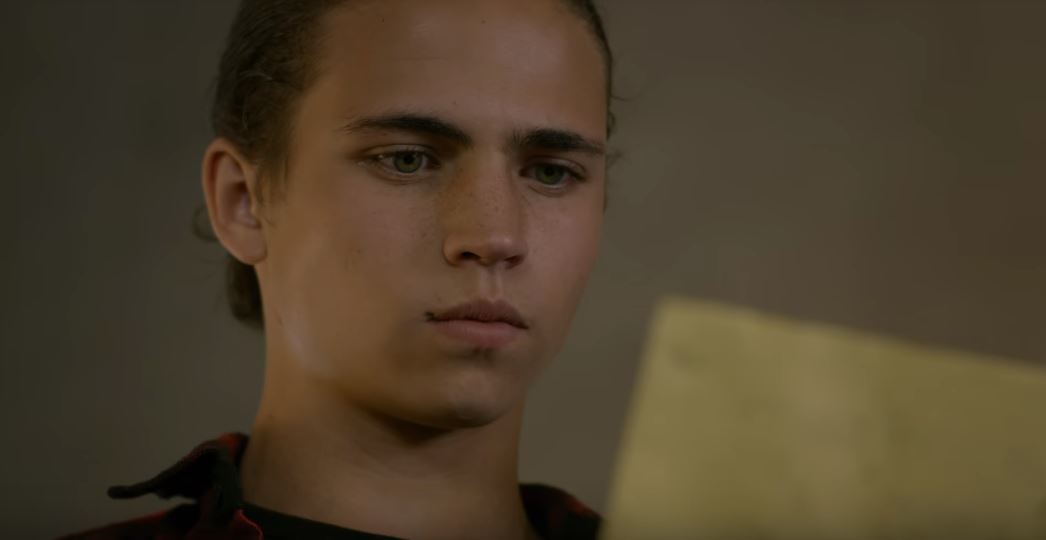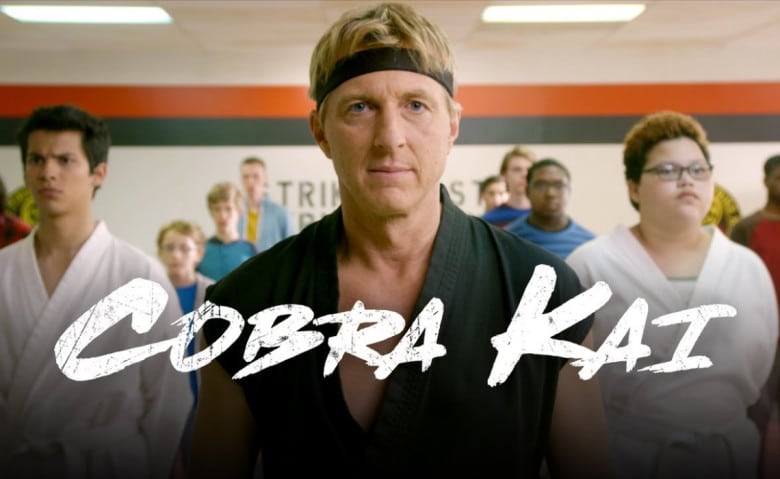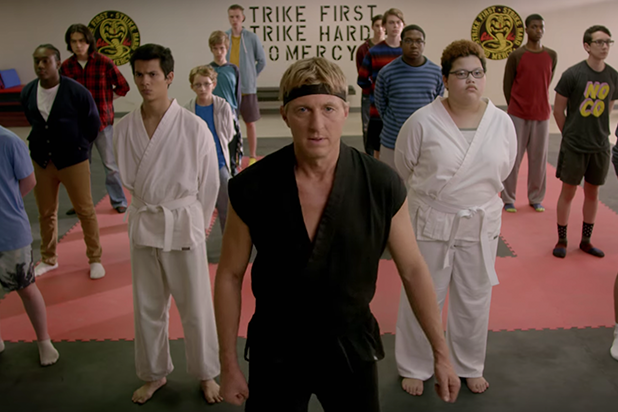Cobra Kai is one of those ultra-rare moments in entertainment where the series not only captures on the magic of the movie The Karate Kid, but also expands and improves on it. When I started watching the series, I thought the 10-episode arc would be something of a lark, a light-hearted touch on a fond memory of characters that meant a lot to an entire generation.
What I didn’t expect was a tight, character-driven, brilliant show that significantly enhanced the original experience in its own way.
Score: 8.5/10.
In case you didn’t know about Cobra Kai, the entire series dropped on YouTube Red on May 2. Here is the trailer (2:34 minutes):
[youtube=”https://www.youtube.com/watch?v=xCwwxNbtK6Y”]
The premise of the show is simple. The 1984 All Valley Under 18 karate tournament was a watershed moment for both Daniel LaRusso and Johnny Lawrence. While the events in the film began the slow turnaround for young Daniel, Johnny’s fall from grace was immediate and brutal.
Role Reversal… or Growth?
The trailer leaves one with the impression that Johnny and Daniel switch roles. Could Daniel actually be the bad guy, here?
To be honest, that was my fear when seeing the trailer. To do so would be a hack, a cheat to the spirit of the series. Such a plot “twist” would be far too easy. After all, how simple would it be for Daniel to “forget” where he came from and suddenly become the bully that he once fought?
Yawn.
Fortunately, that’s not what happened. Instead, we get the reluctant anti-hero in Johnny Lawrence and the demon-haunted Daniel, both of whom holding on to long-standing prejudices and memories in a world that has moved on around them.
In their own way, neither Daniel nor Johnny can let go of high school. It’s a new take on the former high school football star who simply can’t let go of those glory days (cough The Ranch cough), but it manages to avoid the trite lack of self-reflection that plagues such plot devices.
Instead, the scripts take Daniel and Johnny beyond just their rivalry. Both men are fathers, but neither of them are competent at it. Instead of simply shifting the story to the ‘new generation,’ though, the matrix of dynamics is carefully interwoven throughout each episode.
Playing to the Fans
For years, Billy Zapka has stated in interviews that he played Johnny as if he were the hero of the movie. From his perspective, Daniel came to California and stole his girl, a theme that was deliciously explored in How I Met Your Mother (3:14 minutes):
[youtube=”https://www.youtube.com/watch?v=Nrzqc7F-Ans”]
What’s not amazing is how this mindset is explicitly explored in Cobra Kai. In one scene Johnny tells his new student Miguel (Xolo Mariduena) about the girl who got away, stolen by the newcomer before they had a chance to work it out. What is amazing is just how well this works. Instead of justifying Johnny’s behavior as a teenager, it underscores just how much his sensei had screwed Johnny up.
In Johnny’s mind, he has completely glossed over his own teenage murderous intent, bullying tactics as king of the school, and tormenting of not just Daniel, but anyone who had been weaker than he and his Cobra Kai posse. It’s more than just turning himself into a victim, though, it explains how he has wrapped his entire existence around how he got dealt an unfair hand in life and uses it as an excuse for his current failings.
Daniel, for his part and despite all his successes, remains the tormented, bullied kid at heart. Underneath his achievements he remains, still, the new kid on the block who profoundly fears and dreads not just the Cobra Kai name, but also the memories. For Daniel, his insecurities are his daily demons, and cloud every interaction he has with Johnny.
Even in the first scene where we see Daniel meeting Johnny after years of absence, you get the sensation that while Johnny does not want to be there, Daniel shares at least some of that trepidation. He is awkward (then again, he is always awkward), and there is more than just a little hope that things have changed now that they’re older. He makes awkward jokes and uncomfortable comments, and it’s clear he can’t figure out where Johnny actually stands on how to deal with the situation. He overcompensates.
The entire series builds upon these two men, whose characters are remarkably consistent. Johnny is stuck in the 80s, somehow unaware of what the Internet or political correctness is. He has no tolerance for what he sees as the lessons being taught to keep kids weak (e.g., Social Justice; more on this below), and Daniel is struggling to find the peace and his center without his beloved mentor, often allowing himself to overreact to some situations, and underreact in others.
Both men find their calling in teaching, though, which drives the series to its inevitable climax at the new All-Valley Under 18 tournament where their charges will compete.
Not Perfect, and Yet So Perfect
The brilliance of the series is that nearly everyone is cast perfectly. Macchio and Zapka play their roles so well, and so convincingly, that the reasons why they do what they do are never off-kilter. Johnny doesn’t snap into teaching like a well-placed Lego; he berates and humiliates his charges – and they understandably leave. Daniel has allowed himself to have two kids who don’t respect him, because his own insecurities have kept him from actually taking charge, even in his own home.
Newcomers Xolo (Miguel), Jacob Bertrand (Eli/Hawk), and Nichole Brown (Aisha) are so perfectly cast that you can’t possibly imagine those roles covered by anyone else. They bring not just empathy and substance to their place in the series, but watching their character development is a true treat to watch. As Johnny’s students, they each react differently to his approach, but they do it completely in line with their characters and are believable.

Xolo Mariduena
Even Tanner Buchanan (Robby), who starts off as the trite juvenile delinquent with an unremarkable wooden delivery, begins to evolve into a believable character who has found that his actions eventually have consequences that may not be what he actually wanted in the first place. In Cobra Kai, characters’ actions have consequences that persist, and issues are not resolved with a rousing speech or kick to the face. Kids lie to adults, adults react based upon those lies, people get hurt, and the consequences move on. It’s a refreshing change from the episodic approach we’re used to in short-form dramedy television.

Got wood?
In any case, the show is not without its flaws. The tired trope of the ineffectual father remains its unbroken record with Cobra Kai, unfortunately. Johnny is a deadbeat dad, and Daniel is so ineffectual as to practically be non-existent as a father figure. His son, Anthony (played by one-note Griffin Santopietro), is a disrespectful twit who not just needs to run laps, but needs a serious smackdown for his backtalk. However, Daniel gets no support from his wife (played smugly by Courtney Henggeler), who seems to find anything and everything her kids do beyond reproach.
When their daughter, Sam (another one-note character, played by Mary Mouser), sneaks off for some one-on-one time with her boyfriend and Daniel catches her – literally – with her hand down his pants, Daniel freaks. However, less than ten seconds later, Daniel is made to feel like he has invaded their privacy (she’s 15), and his wife chastises him for “embarrassing” Sam in front of her boyfriend.

Sam, pre-hands-down-the-pants scandal
While Daniel’s reaction is aligned with his “people-pleasing” character, the long-standing “don’t embarrass me, Dad” and subsequent ongoing emasculation by his wife (not to mention, where is her outrage at her daughter?) continues the emerging tradition of not saying “No” to kids, no matter what the situation.
When Sam’s boyfriend and “mean girls” friends later spread a rumor about her having oral sex, there is no connection of the dots. Either Daniel or her mother could have reinforced the idea that this is why it was a bad idea, and why Daniel freaked. It was an opportunity that was missed, however, just like so many others when it came to the parenting story arc.
It could also be said that the finale (no spoilers, I promise) was predictable and a copycat of the original Karate Kid fight. While not as bad as Star Wars: The Force Awakens in the blatant ripoffs of past material, the parallels are impossible to avoid or ignore. Swap an injured shoulder for a knee, and you have the same cadence. Total ripoff.
Or… not.
As I mentioned, Cobra Kai is not an action show, it is a character-driven show. The competition at the end of the series places each key character in stark relief, the choices they have made up until that point, and the consequences of their actions laid bare and open. More than one character’s eyes are wide open, here. In one moment, we see the dangerous transformation of Miguel, and the horrific devolution of Eli. We see the path that Daniel has chosen, but even he knows he has still further to go.
No one, though, has as stark a revelation as Johnny. His entire existence has been thrown into a tailspin based upon what he sees at the competition, his own demons are now conferred upon his students, he begins to question not only himself, but everything he had convinced himself was correct and just. He is unsure what it means, unsure where to go from here, but he knows that his life has taken a horrible, terrible turn.
Not For Everyone
As I mentioned above, the show has its moments where it absolutely skewers political correctness and the over-the-top social justice crap being pushed everywhere. In one notable scene, a teacher stands in front of the school lunch crowd, prattling on about gender-neutrality, and the kids ignore her, eyeroll, and overall act like teenagers. Humor the social justice warrior so that she goes away.
Johnny, for his part, doesn’t understand when Miguel tries to correct his ‘insensitive’ nature to his students. He points out that these attitudes are what make them easy prey, because it keeps them ill-prepared for the predators of the world.
As you can imagine, this attitude triggered some people (I highly suggest reading some of the comments on that piece, btw). There are actually criticisms of “cultural appropriation” which – as far as I’m concerned – simply underscores the intellectual vacuousness of such an accusation in the first place.
Personally, the fact that this show gave people like this conniption fits just makes it that much better. 🙂
Bottom Line
Despite its flaws, the predominance of the cast is spectacular, the plot interweaves logically and believably, and the final competition (while predictable) pushes the envelope for most of the key characters. There are moments of self-awareness in the show that, instead of simply being fan service, work because they build upon what the fans already know about the characters and their interactions. They don’t remove the viewer from the show with a slap-in-the-face callback to the movie.
The Karate Kid is a classic movie for a reason. It was a simple theme with memorable interactions, both between heroes and villains. Cobra Kai, in a lot of ways, takes these simple building blocks and layers them upon each other to weave a far more intricate tale, without losing any of the charm or – thankfully – rewriting what happened in the past.
Overall, I highly recommend Cobra Kai for any fan of the original movie.
Score: 8.5/10
Episode 1:
[youtube=”https://www.youtube.com/watch?v=_rB36UGoP4Y”]
Episode 2:
[youtube=”https://www.youtube.com/watch?v=_rB36UGoP4Y”]


